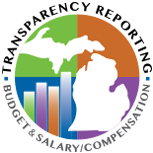Crawford is one of the Internet Safety Expert presenters with the group “Protect Young Eyes.” The organization has given more than 500 presentations across the country to schools, churches and communities. Thornapple Kellogg offered presentations to parents earlier this fall and now the organization is making presentations to high school and middle school students.
Words and images posted on social media sites can have ripple effects on many lives and once started, Crawford said, those ripples are very hard to stop. “Think before you post. We say things with our thumbs (writing posts) we would never say with our tongues.”
He said the internet makes it easy to hide behind other avenues and say or do things we would never say or do in person. “I’m giving you permission to stop the madness. Be done being influenced and controlled by social media,” he said. “It’s your life, your choice. Make it count for something because you only get one life – one opportunity to have great experiences, to soar to new heights and make amazing friends and go on amazing adventures.”
During his presentation he talked about how much screen time is appropriate. Sometimes, he said, teens use their phones to listen to music or play video games as a way of relaxing and getting away from stress for awhile.”That’s ok,” he said, “but you have to look at how much time you are spending on line. Is it the best use of your time?”
During the high school presentation he also warned against looking at or sending sexually explicit photos and images. Crawford warned teens what they write and post and share can have an impact on their lives. He told them a true story about at least 10 high school graduates who were accepted into prestigious Harvard University, only to have their admission denied later because of inappropriate social media content.
“Employers and schools will look at your social media presence and what you have posted can make a big difference,” he said.
He also reminded students that just because someone posts what appears to be perfect pictures of themselves, vacations and their lives, it doesn’t mean it’s all real or true. “You can have thousands of friends on line, but feel alone in a full room because no one really knows you. You’ve built a false identity on line to be popular, but it’s not really you.”
The internet has provided a wealth of accessibility, but with accessibility comes opportunities for foolish decisions. “I’m asking you to open your eyes and see what we’re really doing,” he said.
He encouraged students to take social media break, have meaningful conversations and friendships with others, and more face-to-face time. “You have the power - make the Internet a better place.”

